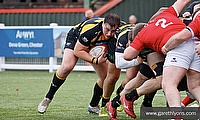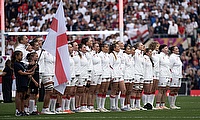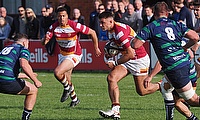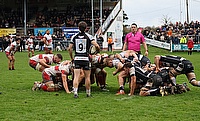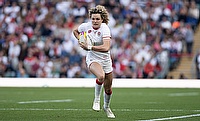'It is just too vague for my liking at the moment’ – Luke Cozens talks tackle height and memories of France
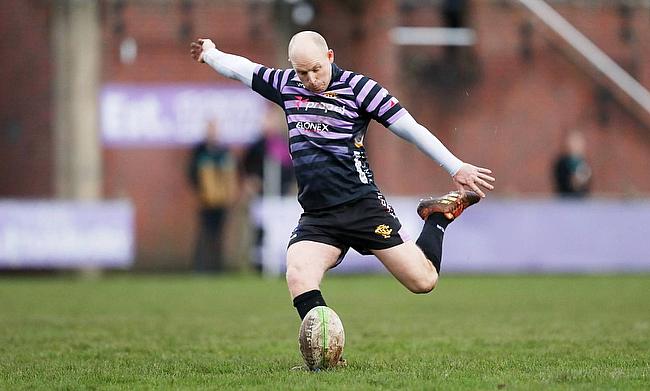
Luke Cozens joined Clifton after time spent as a player, head coach and Director of Rugby with Le Havre
©Ian Clark
Last Thursday, the Rugby Football Union announced the radical change that they would be lowering tackle height to the waist and below in the community game from the start of the 2023/24 season.
This thorough change to tackling across community rugby has largely been made in order to curb head injuries, with tackling from the waist being deemed the most effective way of reducing “head acceleration events”.
Coming following a unanimous vote by the RFU Council, the announcement has drawn plenty of criticism. Both current and former professionals have made their feelings clear, while an online petition has acquired over 68,000 signatures to date.
To be introduced in the men’s game from National One and below - and in the women’s game from Championship One down - the coming months will see the RFU roll out law variation and law application guidelines, as well as offering support to clubs and referees.
The RFU Council were with a series of studies conducted in England and overseas, one of which being a French study which started in 2019. Back then, current Clifton [who play in National Two West] fly-half Luke Cozens was not only playing for Le Havre Athletic Club but was also their head coach and Director of Rugby.
At the time, Le Havre were competing in the fourth division of French rugby, Cozens guiding them after a season back in England with Hartpury.
Taking charge of the side the summer which the law changes were introduced, the trial banned tackles above the waist and after a rise in penalties in the opening stages of the campaign, it resulted in a 63 per cent reduction in head-on-head contacts and a 27 per cent decrease in suspected concussions.
“They literally just sprung the rule change and said ‘you will be using these from now on’,” the Bristolian told TRU. “Like the RFU, they said they’re going to do all this help for the clubs, the referees, etcetera. Hard work that.
“Straightaway, I thought; how are the referees going to do this? The referees took so much abuse for the first few months. For example, in pre-season there was a game – not my team – there were 44 penalties in the first half. The president marched his team off the field.
“When we first started, the penalty count was just humongous. There were so many grey areas to it. If the ref refs the laws like they have been told, they will be blowing that whistle non-stop.
“Then, yeah, you might get a quicker offloading game, but what comes with penalties? Set piece and lineout. The game stops and starts. In one way it speeds up the game, but in another way, it slows it down.
“Honestly the first three months, the players, coaches, fans, referees, it was hell. I know there will be problems. It took a good season to adapt, but those first three to six months were hellish.
“I have seen French presidents refuse to let referees into the clubhouse after because they had spoilt the game. That is the sort of emotion it was driving into people.
“I wonder where they got their data from? We were in the highest league [in the study] in France, were we once approached with data? Who was monitoring? There is no way in hell they have got that data.
“Where is factoring in how many concussions ever happened with kneecaps or hips? They might tell me otherwise, I’m sure they can produce data, but first-hand I’d never take any of that French data. No chance.”
It is this study in France that most closely mirrors what the RFU are hoping to implement. Other studies referenced have included the union’s own which was conducted in the Championship Cup, which World Rugby’s Research Consultant, Professor Ross Tucker termed as “unsuccessful” in The Times.
A trial in Stellenbosch was also referenced where tackling was reduced to the sternum, where initially there was no change to concussion rates until players began to tackle lower, while a mouthguard study by Otago University has also contributed to the changes.
Since Thursday, the announcement of the tackle height in the community game has been described as a “PR disaster” and came on the same day that 55 former amateur players joined a class-action lawsuit against governing bodies, the RFU, Welsh Rugby Union and World Rugby.
With player numbers having dipped post-Covid, through making a change that seems radical in the short-term, any attempt to make the game safer in the long-term can only be deemed as an immense positive.
By the end of the phone call, Cozens is keen to impress that with all the unknowns. It is difficult to outright dismiss the changes altogether. He also accepts that there will be an adjustment period for all involved, with attack due to take advantage of the law change.
There is a consensus that any attempt at reducing brain injuries is inherently good, but how the game’s governing body in England handled the matter was lacklustre to say the least.
There is a conception that tackling low opens up the tackler to the potential of receiving blows from the knees, feet and the hips. With tacklers having their heads in a more compromised position, it is discouraging for players and one of the key issues which the RFU must address in the months to come.
There is also a lack of clarity regarding the future of mauling, rucking and defending in close quarters. For Cozens, these sorts of questions he heard from teammates at Clifton the night the news broke are similar to the queries he listened to during his time in France.
“I have seen all the reactions of all these people on Twitter, it was exactly the same [in France], about ‘how are we going to do this? How are we going to do that?’,” Cozens said. “I have seen a lot about mauling, that won’t change. It is a separate part. Rucking, that won’t change.
“The ruck and the maul is not a problem with these new rules. It is the open play, the 10 meters, the five meters from your line. In France, you weren’t allowed to nose-dive into the ground. So, pick-and-go, you had to move upwards and stay on your feet.
“They did that so the block can chop when they are near the line but likewise, their other rule was that if you dive to score a try and you don’t score, because you are diving at that angle, you’d be penalised.
“I think what the RFU have said is so vague. It has not gone into any details about specific rugby incidents or things that come up in a game that we call ‘rugby related’. Maybe it might work, I don’t know. You can’t just be pigeonholed, but it is so vague at the moment. I know there will be problems.
“I would say we are more open to adapt than France. We’ll see. Until they get to the nitty gritty of rules, it is just too vague for my liking at the moment.”
There are some distinct differences between the RFU’s change in tackle height and the French study. In France, there was no simultaneous tackle assist, whereas in England double tackles will be allowed.
Additionally across the English Channel, there was the implantation of a white and blue card to the referees’ arsenal, which were used to streamline the officiating process, something which Cozens believes could be useful moving forward in community rugby.
“You had a yellow card, red card, but you also had a white card and a blue card,” Cozens said. “The yellow card will be foul play, or if it’s really foul play it will go to red.
“The white card will be exactly the same as a sin bin, so you lose a player for 10 minutes, but you can get as many of them as you want. In England, after four or five penalties, that’s the yellow card coming out.
“What’s that going to be now? It is going to be double the amount of penalties. What are the boundaries of where a yellow card comes out? They [English referees] haven’t got a white card, so if you get two yellows, you are getting a red card.
“The other card was a blue card which the referee can use when in his eyes, he deemed someone was concussed. No discussion, that player leaves the field and gets replaced. Did I ever see that card in two seasons? No. We subbed a few blokes. They weren’t keen to use it.
“I think that four card system works. With the new rules, with the penalty count so high, you could see a lot of players off the field. In England, you could pick two yellows up no problem now.
“What are they telling the referee about what it requires to be a yellow card now? Is it four penalties or is it eight penalties? They had some things right, but because the RFU are so vague at the moment, I can’t see how there won’t be problems. At the moment, they are not showing they have thought about it.”





